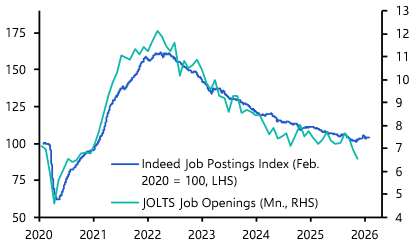The recent flow of both news and data from Europe has painted an increasingly gloomy picture and events this week are unlikely to provide much respite, with Italy’s government facing a deadline on Tuesday to submit a re-drafted budget to Brussels and then GDP data due on Wednesday likely to show that Germany’s economy barely grew in Q3. So how should investors navigate the increasingly troubled waters in Europe?
One of the challenges is distilling the sheer volume of news. Stepping back, though, three major developments over the past couple of months stand out. They are:
a) The weakness of the latest activity data;
b) The stand-off between Brussels and Rome, and Italy’s perilous fiscal trajectory more generally; and
c) The decision by Angela Merkel to resign as head of the CDU and to step down from the Chancellorship when her term in office ends in 2021.
To cut a long story very short, our view is that investors should worry less about (a) and more about (b). And the extent to which (c) becomes a problem depends in part on how quickly and to what extent (b) escalates. Simple, right?
At first sight, the sharp slowdown evident in the latest data should set alarm bells ringing. While the US economy grew by 0.9% (3.5% annualised) in Q3, the euro-zone grew by just 0.2% (or 0.6% annualised). Italy’s economy stagnated and Germany’s economy looks likely to have grown by 0.1-0.2%. (It’s a quirk of European statistics that Germany releases GDP data after we get the euro-zone aggregate.)
But we think that the slowdown in euro-zone growth can be explained in large part by the disruption to auto sectors caused by the rollout of new emissions tests. (See this for more detail.) These new regulations have hit car producers in Italy and Germany especially hard, and both economies appear to have borne the brunt of the slowdown in GDP growth in Q3. In contrast, France and Spain – whose car sectors have been less affected by the new regulations – posted relatively decent GDP figures. (See Chart.)
Chart: Real GDP Growth (% q/q, SA)

The key point, however, is that once the disruption caused by the emissions tests fades, there is likely to be a bounce in output in the countries most affected as producers make up for lost time. Brace yourselves for a barrage of negative headlines about Germany’s economy on Wednesday, but our sense is that growth will rebound in Q4.
The challenges posed by Italy appear more intractable. As I’ve noted before, its problem is primarily one of low growth rather than acute fiscal difficulties (the government is actually planning to continue running a primary budget surplus in 2019, 2020 and 2021).
This raises the prospect that Italy might muddle through for a long time, provided that the bond markets remain quiescent. But at low rates of growth the arithmetic that underpin the public debt dynamics become extremely sensitive to small changes in bond yields. And while the EU has so far won all of its battles with fiscally profligate governments, there is no sign yet that Rome will back down. It’s not difficult to see how all of these risks could crystalise as the ECB shifts from policy accommodation to policy tightening in 2019.
This is where the recent political developments in Germany start to come into play. The decision by Angela Merkel to step down as the head of her party, the CDU, was expected at some point, and it was likewise understood that she was likely to step down as Chancellor when her current term expires in 2021. The immediate implications for Germany’s economy are limited.
Instead, the much bigger issue is that Mrs Merkel’s decision to step back comes against the backdrop of German government coalition that is already starting to fray around the edges. Even if the coalition survives, there is a risk that a disjointed government in Berlin will be less able to lead a rapid response to problems in Italy if they intensify. And there is now an even greater question mark hanging over the more fundamental issue of euro-zone reform. The key message, then, is that when thinking about the outlook for Europe’s economy, we should focus less on the latest quarterly growth numbers that are grabbing the headlines and more on the structural challenges that remain at the heart of the euro-zone.
In case you missed it:
(Requires login)
- Our US team explains why the midterm elections are unlikely to have much bearing on America’s economy.
- Our Chief Markets Economist, John Higgins, unpacks the recent jump in TIPS yields.
- Our China team explains why the latest data suggest that the PBOC is now intervening to support the renminbi.



